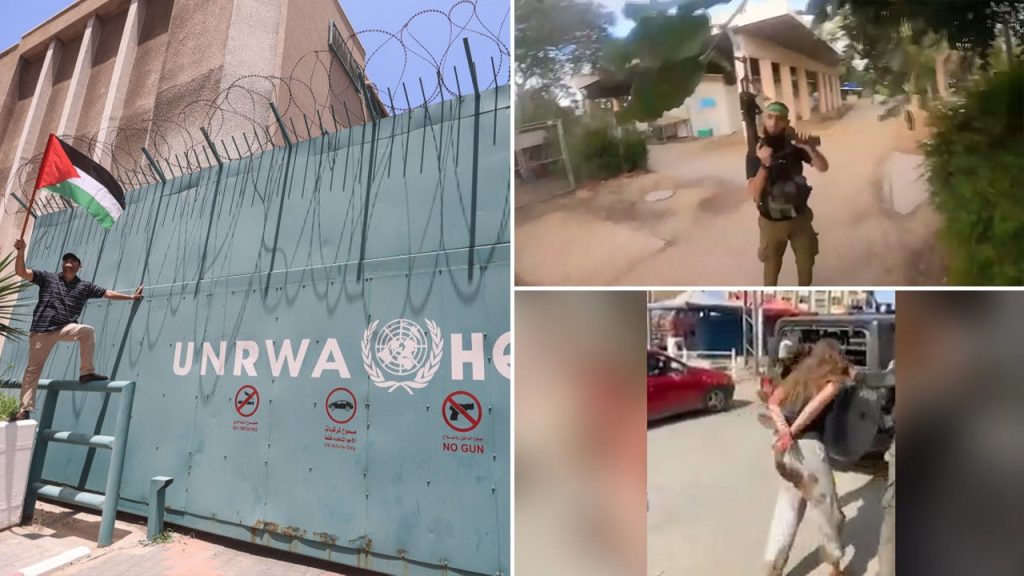The United Nations Relief and Works Agency for Palestine Refugees in the Near East (UNRWA) is embroiled in a deepening scandal, facing renewed allegations of ties to terrorist organizations following the Hamas massacre in Israel. Geneva-based NGO, U.N. Watch, has released a damning dossier alleging complicity between high-ranking UNRWA officials and terrorist groups. The dossier, partially released to the public, includes photographic evidence of meetings between UNRWA officials, including current and former Commissioners-General, and members of Hamas, Islamic Jihad, and other designated terrorist organizations. U.N. Watch’s Executive Director, Hillel Neuer, attempted to present the evidence to UNRWA Commissioner-General Philippe Lazzarini before public release, but was reportedly rebuffed. The released photos depict meetings that allegedly took place over several years, including a 2014 gathering where UNRWA regional directors congratulated a senior Hamas member on the organization’s anniversary. Another documented meeting from 2017 shows former Commissioner-General Pierre Krahenbuhl expressing solidarity with members of Hamas, the Popular Front for the Liberation of Palestine (PFLP), and Palestinian Islamic Jihad (PIJ).
The allegations against UNRWA come amidst heightened scrutiny of the agency’s operations. The U.S. Department of Justice recently charged several Hamas leaders, including one pictured with UNRWA officials, for their involvement in the October 7th terror attack that killed over 1,000 people, including 40 Americans. The timing of these charges further fuels concerns about UNRWA’s alleged tolerance of, or even collaboration with, terrorist elements. Adding to the controversy, former Commissioner-General Krahenbuhl, who resigned in 2019 amidst allegations of misconduct, was recently appointed head of the International Committee of the Red Cross (ICRC). This appointment has drawn criticism from members of the U.S. Congress, who have questioned Krahenbuhl’s suitability for the role given his controversial tenure at UNRWA. The ICRC, however, defends Krahenbuhl’s appointment, citing the necessity of engaging with all groups controlling access to civilians in conflict zones.
Beyond the alleged connections between UNRWA staff and terrorist groups, the agency also faces accusations of promoting hate and violence within its educational programs. U.N. Watch’s dossier includes interviews with UNRWA students who describe being taught to “fight back and resist” and to “kill the Jews.” These testimonies raise alarming questions about the nature of the education being provided to Palestinian children within UNRWA schools. Independently corroborating these claims, another NGO, IMPACT-se, has been documenting problematic content in UNRWA educational materials for over two decades. Their latest report identifies several high-ranking UNRWA school officials as members of Hamas or PIJ, some of whom participated in the October 7th terror attack.
IMPACT-se’s research reveals a disturbing pattern of incitement and violence promoted within UNRWA schools. The organization found instances of UNRWA schools promoting hatred and violence against Israel, inserting such content even into grammar exercises. The report also alleges that some UNRWA schools headed by Hamas members were used to conceal tunnels constructed by the terrorist organization. This not only violates fundamental educational principles but also raises serious security concerns. IMPACT-se’s findings indicate that UNRWA schools are failing to adhere to UNESCO standards promoting peace-building and respect for diverse groups, instead fostering an environment of hostility and intolerance. Furthermore, intelligence cited by IMPACT-se estimates that over 10% of senior UNRWA education staff in Gaza are members of Hamas or PIJ, a clear violation of UNRWA regulations prohibiting affiliation with designated terrorist groups.
UNRWA has responded to these allegations by dismissing them as disinformation aimed at dismantling the agency. They characterize U.N. Watch’s student interviews as manipulative and misleading, claiming the children were questioned without parental consent and prompted to give specific answers. UNRWA Commissioner-General Lazzarini has cautioned against spreading such disinformation, urging scrutiny of the sources and intentions behind the accusations. He argues that such accusations contribute to a climate of hate and endanger lives. This defensive stance has done little to quell the growing international concern surrounding UNRWA’s operations and its alleged links to terrorism.
The allegations against UNRWA have serious international implications. The United States, a major contributor to UNRWA, has paused its funding pending further investigation. Several other countries followed suit, raising concerns about the accountability and transparency of the agency. With mounting evidence of ties to terrorism and incitement within its educational system, UNRWA faces a crucial moment. The international community must demand a thorough and independent investigation into these allegations to ensure that aid intended for Palestinian refugees is not being diverted to support terrorism or promote hatred. The future of UNRWA hinges on its ability to demonstrate a genuine commitment to neutrality, accountability, and adherence to humanitarian principles. Failure to address these concerns effectively could erode international trust and jeopardize the vital assistance provided to Palestinian refugees.


